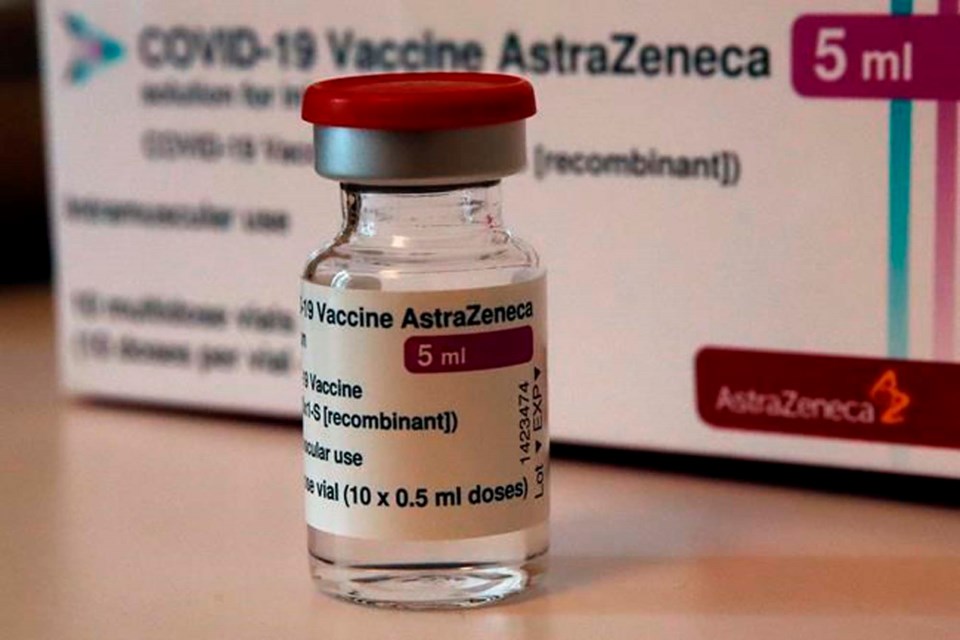This would not have involved pharmacies in Northern Ontario, which did not become part of the pharmacy plan until the second week of April.
The details of the new initiative were revealed at a technical briefing held Friday morning, and hosted by Dr. David Williams, Ontario's Chief Medical Officer of Health. He explained that for a limited time during the week of May 24, people who received their first dose of AstraZeneca during the period of March 10 to March 19 may opt for their second dose. It would happen at an earlier dose interval of 10 weeks with informed consent.
This will be providing the second dose sooner than expected, and sooner than what is considered the optimum time period.
The idea of the second vaccine dose is to top up your body's immunity to the coronavirus, by preventing serious illness, preventing hospitalization and preventing death.
"Some people feel that when you get the second dose you have reached your maximum capacity within a few hours," said Dr. Williams. "It takes weeks to build up that immunity.”
Choosing to receive the second dose of AstraZeneca at the 10-week interval is safe and provides strong protection against COVID-19, said a Ministry of Health news release. This opportunity is being made available to ensure every vaccine dose possible is used to protect Ontarians during the effective delivery period, said the ministry.
Eligible individuals are encouraged to contact the pharmacy or primary care provider where they received their first dose and can book an appointment beginning the week of May 24. This will begin in the regions where the AstraZeneca vaccine was initially launched in pharmacies in March 2021 (Kingston, Windsor, Toronto), said the news release.
Primary care settings and pharmacies may also be reaching out to eligible Ontarians, said the province. Several Southern Ontario health units also administered AZ vaccines. These included areas such as Guelph, Peterborough, Simcoe-Muskoka, Wellington-Dufferin and Peel.
Dr. Dirk Huyer, the coordinator of the provincial outbreak response team, said the plan is to use the soon-to-be expired AZ doses to provide second doses to those who want them.
"So there's approximately 55,000 doses of AstraZeneca, many of which the effective period of delivery is May 31st and so we are focussing on those in this incremental approach to providing second doses in those who have received AstraZeneca's first dose. So right now the first focus is on those 55,000," said Huyer.
The decision on Friday to give the second doses of AstraZeneca follows a decision announced on May 11 where the province "paused" the administration of first doses of AZ based on concerns it was contributing to blood clots in some recipients. During a media question period Friday, there was a question about how the province would proceed with the AZ vaccine due to its links to blood clotting.
Williams said the "pause" on giving out first doses is still in place because of the concern over a blood clotting condition known as VITT (Vaccine-Induced Immune Thrombotic Thrombocytopenia).
The ministry news release said the pause was put in place out of an abundance of caution.
Williams said the most recent data from the United Kingdom where the AZ vaccine was developed suggests a much-reduced risk of VITT in second doses of AstraZeneca – one in 600,000.
"Still very, very low," said Williams.
The news announcement said those who choose next week to book their second dose in the coming week, will be getting it at a 10-week interval period, and not the 12-week period which is considered an optimal period.
The news announcement Friday said those who do not receive their second dose at the 10-week interval can still choose to receive a second dose interval of 12 weeks.
"The province is working with primary care providers and pharmacies to ensure second dose appointments are scheduled in advance of the 12-week interval, and will provide further information on how individuals who received their first dose of AstraZeneca can book a second dose appointment in the near future," said the ministry release.
Under questioning from the media, Williams admitted some data has indicated that patients would be better off to get a 12-week interval. Williams said any benefit was "fairly negligible" and there was no specific data. He added that Ontario's ministry of health would still like to go for the 12-week interval when it is possible.
One reporter asked that with 55,000 vaccines set to expire at the end of the month whether it had people feeling like experimental guinea pigs.
What can be said to reassure Ontario residents that they should be comfortable in getting the second dose, asked the reporter
"We hear you," said Dr. Huyer. "We want to ensure that people have the best information available."
He said when AstraZeneca was first made available that it was a vaccine that was touted as being among the best available. Huyer said anyone who took the first dose of AstraZeneca can be assured they have done their part in reducing the spread of the virus, in protecting themselves and the population and "decreasing the burden of disease."
Huyer said the second dose will do its job of preventing serious illness, hospitalization and death.
Len Gillis is a Local Journalism Initiative reporter at Sudbury.com. He covers health care in Northern Ontario.
